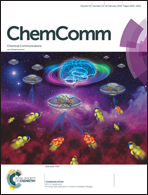Multiple binding modes of an unconjugated bis(pyridine) ligand stabilize low-valent [Cp*Rh] complexes†
Abstract
The ligand 2,2′-bipyridine (bpy) can support metal centers in low formal oxidation states by delocalization of electron density into its π-system. We show that, in a model rhodium complex supported by the pentamethylcyclopentadienyl ligand (Cp*), the analogous dimethyldipyridylmethane ligand (Me2dpma) enforces a bpy-like coordination environment but disrupts the inter-ring conjugation responsible for charge delocalization upon metal reduction. As a result, reduction proceeds in discrete one-electron steps (Rh(III) to Rh(II) to Rh(I)), contrasting with the 2e− chemistry engendered by bpy. Upon reduction to Rh(I), the Me2dpma ligand rearranges to activate strong π-backbonding via facial coordination of one pyridine motif. Structural and spectroscopic studies confirm stabilization of the Rh(I) center in this compound, revealing a mode of metal–ligand cooperation that represents a useful counterpoint to charge delocalization in conjugated poly(pyridyl) ligands.
![Graphical abstract: Multiple binding modes of an unconjugated bis(pyridine) ligand stabilize low-valent [Cp*Rh] complexes](/en/Image/Get?imageInfo.ImageType=GA&imageInfo.ImageIdentifier.ManuscriptID=C7CC09164H&imageInfo.ImageIdentifier.Year=2018)


 Please wait while we load your content...
Please wait while we load your content...